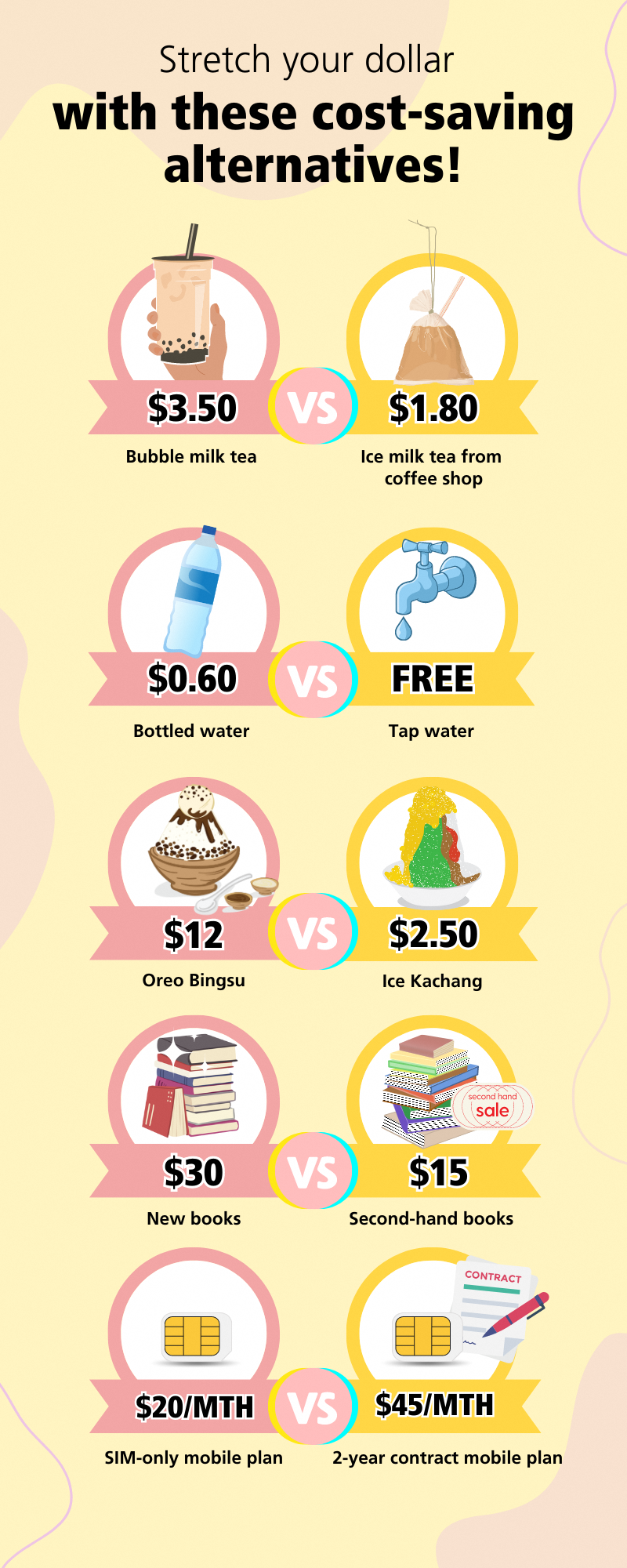11 May 2023
SOURCE: CPF Board

Saving money is not an easy task, especially when there are plenty of exciting wants that can eat into your hard-earned cash.
But here's the thing: building a habit of saving is an important step to take for your finances. From saving for your retirement to keeping an emergency fund, maintaining a healthy savings account can make all the difference in navigating through life's unexpected storms.
In this second instalment of Money Matters, a three-part series on basic financial literacy, let us walk you through the importance of a saving habit and provide some practical tips and tricks for maximising your money.
Starting a saving habit is key to achieving financial security. While relying solely on your monthly income to cover basic needs is important, it is also crucial to have savings that you can tap into when unexpected expenses or emergencies arise.
Depending on your monthly income alone can lead to financial stress, especially during periods where you are not working or during retirement when your income may be reduced.
By making saving a regular part of your financial routine, you can ensure that you have a cushion to fall back on in times of need without sacrificing your basic needs or desired lifestyle.
The best thing about a saving habit is that anyone can do it. Whether you earn a lot or a little, there are always ways to adjust your expenses to save money. Don’t be discouraged if you feel like you're not making enough money to save - with the right mindset and these practical tips, anyone can develop a saving habit.
It’s perfectly understandable to treat your wants as needs. However, recognising the difference between the two is crucial to avoid overspending.
Needs:
A need is an expense that you cannot avoid. It is something that is completely essential in your life. Some examples of needs are:
- Food
- Housing
- Transportation
Wants:
Wants are not necessary for daily living. They go beyond your basic needs and make your life more enjoyable and comfortable. Some examples of wants include:
- Restaurant meals
- Luxury products
- Jewellery
Before making a big purchase, take some time to reflect if the item is truly a need or a want.
This simple step can help you make more mindful spending decisions and develop a healthy saving habit for the future.
If the item is not essential for your survival, consider if it’s worth saving up for and something that will bring value to your life in the longer term.
Setting a saving objective is a great way to kick start your saving habit. With a goal in mind, mapping the path to achieve it is easier.
You can have multiple saving objectives, but it's important to feel comfortable with each of them. Here are some common goals to save towards:

Visiting iconic destinations such as the magnificent Pyramids of Giza or the charming Eiffel Tower can be an incredible experience, but travelling often comes with a hefty price tag.
One way to turn your wanderlust dreams into reality is by saving a portion of your monthly income towards your next vacation. Creating a travel bucket list can also help ensure that you have a financial goal to work towards. With some discipline and dedication, you can soon be on your way to exploring new cultures and creating unforgettable memories.
A solid emergency fund provides financial security during unexpected circumstances such as retrenchments or health scares.
A recommended number is at least three to six months' worth of basic expenses in your emergency fund. This can be more if you have dependents such as children and elderly parents, or if you have commitments such as a mortgage to maintain. Your emergency fund is meant for a rainy day, so you should not spend it on anything else!
By setting aside money in your emergency fund, you'll have peace of mind knowing that you're financially prepared for any unexpected events that may come your way.
Retirement might seem far away for those that joined the workforce, but it's never too early to start planning for it.
When determining how much to save for retirement, think about the kind of lifestyle that you want during your golden years. After all, your savings will form a key part of your finances once you retire.
By starting to save and plan, you can ensure that you have enough savings to support your desired lifestyle when you retire. Take the first step in your retirement planning with the CPF Planner!
If you're an employee aged 55 and below, 20% of your monthly wage is automatically allocated to your CPF accounts. Additionally, your employer contributes 17% of your monthly wage to your CPF. The contribution rates change when you are above age 55.
These funds are divided into your Ordinary Account, Special Account, and MediSave Account. The savings in your Ordinary Account and MediSave Account are meant for your housing and healthcare needs, while your Ordinary Account savings as well as Special Account savings are for your retirement needs.
When you reach the age of 55, a Retirement Account is also created for you. This account draws the savings from your Special and Ordinary Account to form your Retirement Sum. This amount then provides monthly payouts once you reach your payout eligibility age under CPF LIFE for as long as you live.
Saving money does not have to be painful. You don’t need to be a scrooge or a penny pincher. Instead, it's about putting in effort and pacing your spending to make a saving habit.

An important concept to grow your money is compounding. You earn interest when you put money in a savings account. Over time, you earn interest on the original amount you deposited and the interest you have already earned. This is known as compound interest and can slowly boost your savings.
Think of compounding as planting a tiny seed and watching it grow into a big tree. The more time the seed has to grow, the bigger the tree will be. In the same way, the longer you leave your money in a savings account, the more it will grow because of compound interest.
Have you ever felt like your money tends to disappear even though you do not spend a lot?
There's a simple solution to fix this: track your expenses. It doesn’t matter if you are using a fancy app or a simple spreadsheet, tracking your expenses will reveal where your money is going.
It might be a bit of a hassle at first, but after a while you might not need to track your expenses once you get a better understanding of your spending habits.
The 50/30/20 budgeting rule is an easy-to-follow way to manage your money. It consists of spending your money on:
- 50% needs
- 30% wants
- 20% savings/investments
But here's the thing - everyone's situation is different. You can always adjust the percentages to fit your own needs.
If you're already spending less on wants, feel free to allocate more towards your savings or investments. The bottom line is to make sure you have a clear plan for allocating your money.
Impulse spending can be detrimental to your saving effort. From flash deals to limited edition items, there are plenty of exciting promotions that can lead to splashing the cash unnecessarily.
Here’s a little tip to help with those impulsive spending habits - give yourself a week to think about the item before making buying it. If you forget about it after a week, then congratulations - you just saved yourself some money!
A negative financial cycle is like a domino effect where one bad financial decision leads to another. This creates a downward spiral that becomes increasingly difficult to escape.
Being constantly in debt can lead to a negative financial cycle, hurting your finances in the long run.
To avoid getting trapped in a negative financial cycle, it’s important to wisely manage your finances by prioritising your debt repayment. For instance, credit card debt comes with high interest rates that can reach up to 28 percent.
This negative cycle can persist and worsen over time if you do not track your debts, making it even more challenging to recover.
The age-old adage, "Out of sight, out of mind", can apply to saving money too.
One way to make saving easier is to automatically transfer a portion of your salary to a separate saving account every month. That way, you will not see the money in your account and be tempted to spend it on unnecessary things.

Instant noodles are cheap and convenient, but are they worth sacrificing your health? Investing in your health is one of the best ways to save money and your future self will thank you for doing so.
Eating a healthy and balanced diet may seem expensive at first, but the benefits of preventing costly health problems down the road are more than worth it. Don't forget to exercise by taking part in at least 150-300 minutes of moderate-intensity aerobic activity a week - it's a great way to stay healthy without breaking the bank.
Lastly, health screening appointments can help to catch any health issues early. This would eventually save money in the long run as well!
Deals and promotions are a great way to save some extra cash. This can be especially true if you have been eyeing up a certain purchase for a long time. Consider subscribing to Telegram groups that share the latest promotions such as SG Kiasu Foodies and SG Travel Promos for food and travel deals respectively.
Remember to exercise caution and avoid making impulsive purchases that you might regret later! Sometimes the best deal might be to not spend money at all.
Saving money does not mean that you have to miss out on the good things in life. There are plenty of wallet-friendly alternatives that you can indulge on without putting a dent on your budget.
Here are a few of them:

Here's another nifty tip to help you save - bring your own water! Get yourself a big tumbler and fill it up whenever you're out and about. You’ll stay hydrated and save money by avoiding pricey sugary drinks.
If you're craving something sweet, make your own drinks at home instead of splurging on them outside. It's a great way to satisfy your sweet tooth and save a few extra dollars.
Repairing your torn clothes or faulty appliance might be a more cost-effective solution than replacing them.
Bring your damaged shoes to a cobbler or ripped jeans to a tailor. If you want to take your DIY skills to the next level, you can watch online tutorials or visit the nearest Repair Kopitiam - a local community repair initiative where you can learn how to repair your broken items for free.
Wealth expansion is a combination of reducing your expanse and increasing your income.
Investing in yourself is a great way to potentially increase your income. Upskill and gain knowledge by using initiatives such as the $500 SkillsFuture Credit that can help pave the way for a better paying position. You can also expand your income by finding a side hustle or invest a portion of your savings wisely.
While saving money is important, it's also essential to strike a balance by treating yourself occasionally and enjoying the present. Ultimately, the key is to be mindful of your spending habits and recognise that developing a saving habit can help achieve your financial goals.
If you found this financial literacy guide on savings useful, make sure to view our guide on health insurance too!
Information in this article is accurate as at the date of publication.


